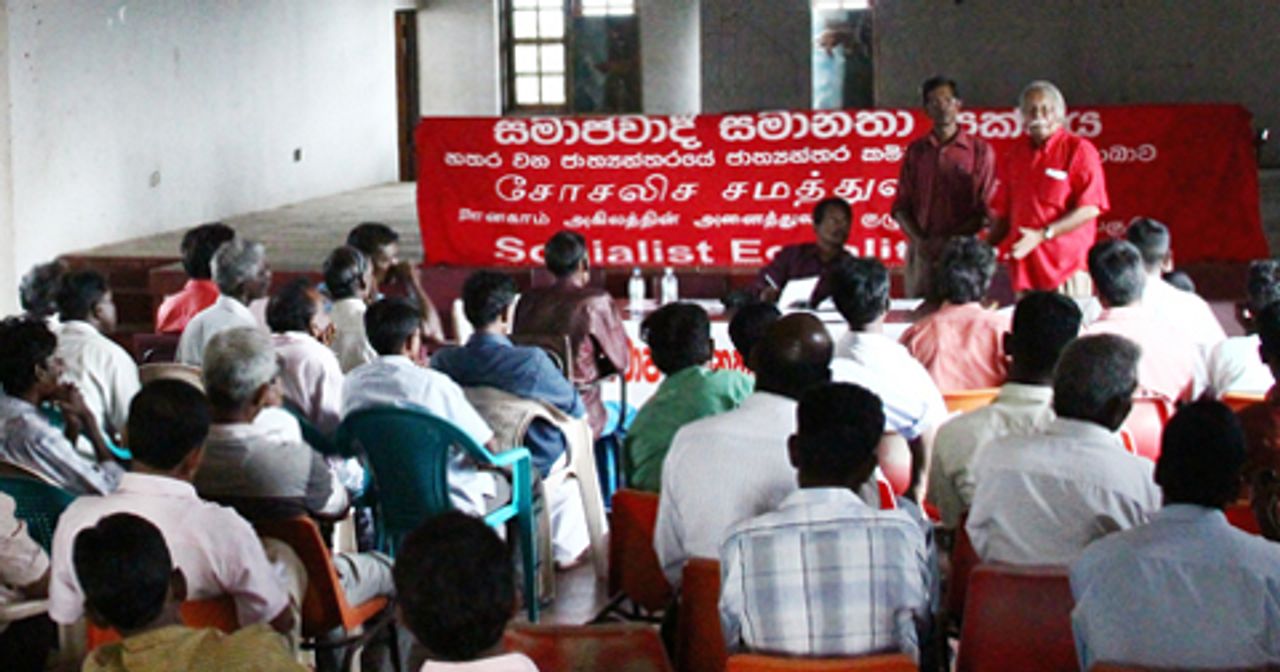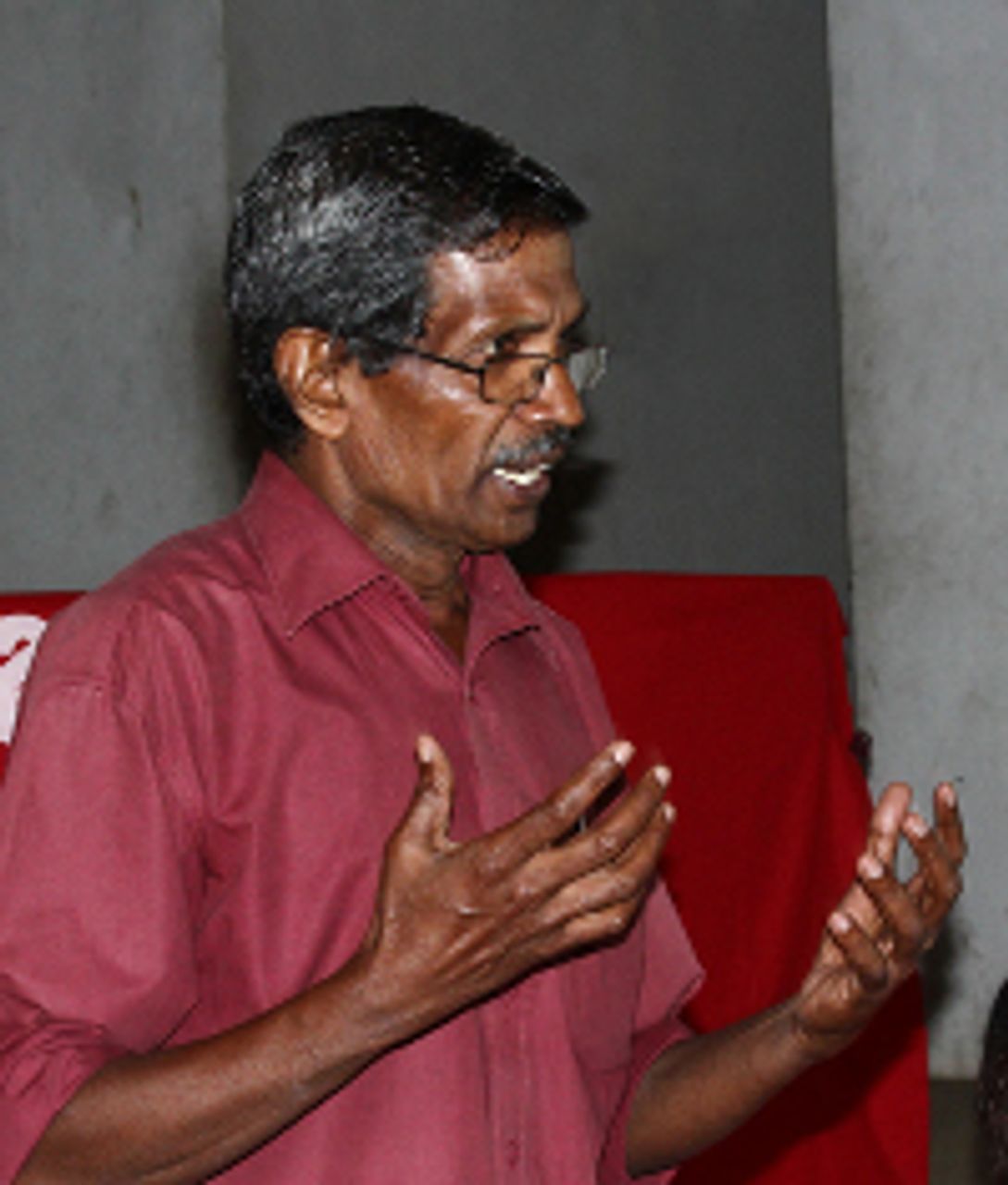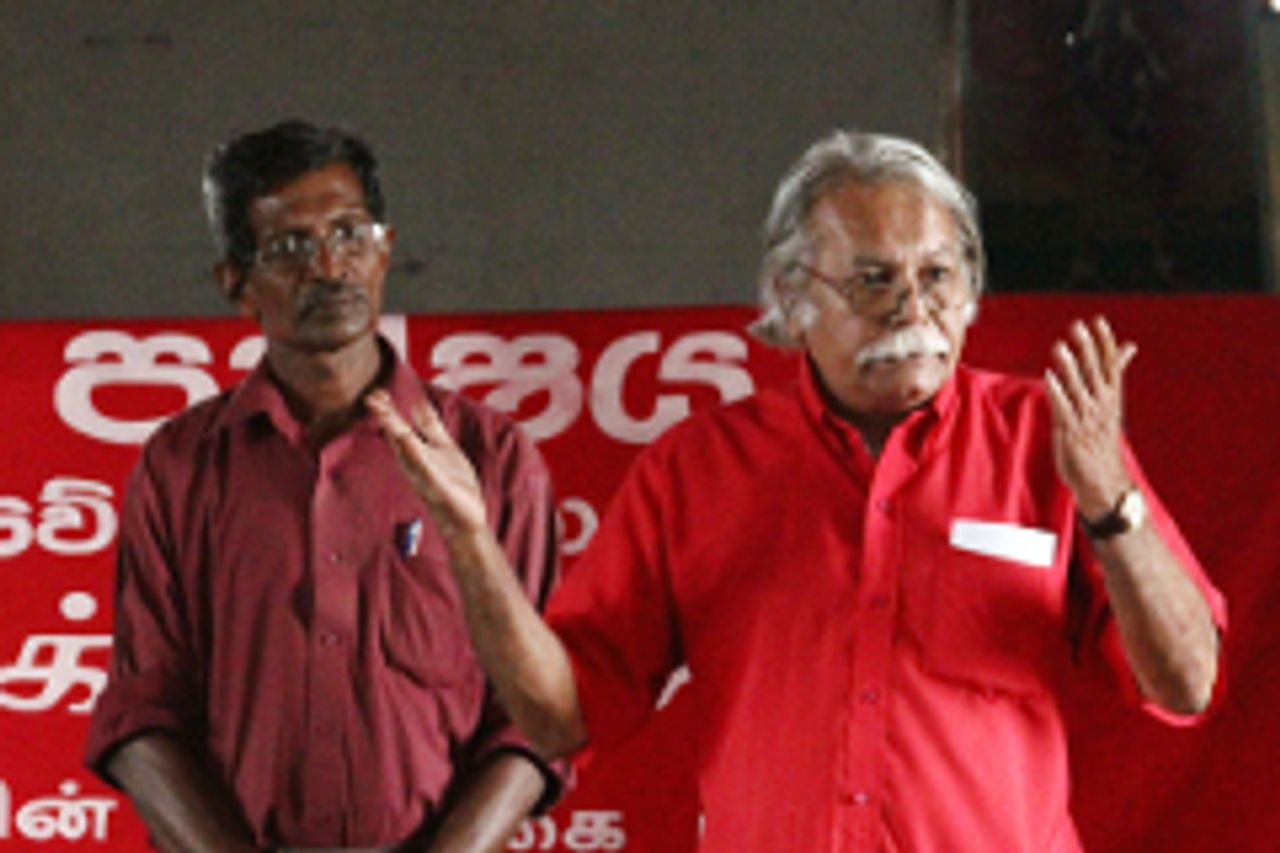On May 20, the Socialist Equality Party and International Student for Social Equality (ISSE) held a successful congress of plantation workers at Hatton, in Sri Lanka’s central hill region. A number of workers, including several dozen from the Nuwara Eliya and Badulla tea plantation districts, as well as youth and students from Jaffna, Kandy and Colombo, participated in the one-day event.
The congress was preceded by a strong campaign over several weeks by SEP and ISSE supporters among estate workers. Thousands of copies of the SEP statement “Sri Lankan SEP calls plantation workers’ congress” and other World Socialist Web Site articles were distributed and discussed with local workers.
The congress was chaired by SEP member A. Shanthakumar, and SEP Political Committee member M. Thevarajah delivered the opening report. Thevarajah noted that the gathering was part of the struggle for a socialist perspective. He explained that 2011 had marked the beginning of a new period of class struggle against the attacks on living standards and democratic rights by capitalist governments internationally.
 Part of the congress audience
Part of the congress audienceThevarajah said that broad layers of the working class and rural poor, including estate workers, had come forward to resist the austerity measures of the Sri Lankan government of President Mahinda Rajapakse. “Many plantation workers in this hall,” he said, “have been engaged in bitter fights during recent months against increased workloads and cuts to wages.”
The speaker pointed to some of these experiences: “Protests erupted in several estates, including the Kotiyagala Estate in Bogawantalawa and the Welioya and Shannon estates in Hatton, as workers opposed the company’s productivity drive. Last week, 14 workers at Kotiyagala were remanded [by the courts] on flimsy accusations made several years ago. These allegations are an attempt to witch-hunt militant workers who were in the forefront of these struggles.”
The Ceylon Workers’ Congress (CWC) directly opposed the estate workers’ protests. Other trade unions such as the Up-Country Peoples’ Front (UPF), the National Union of Workers (NUW), the Ceylon Workers Alliance (CWA) and the Democratic Workers Congress pretended to support workers and told them to “pressure” the companies and the government.
 M. Thevarajah
M. Thevarajah“These organisations have been instrumental in imposing the poverty-level daily wage system and maintaining degrading conditions on workers,” Thevarajah said. “They have done so in order to maximise profits.” All of the trade unions—those which support the government, the CWC, UPF and NUW, and the others aligned with the right-wing United National Party—are “committed to the capitalist system.”
Thevarajah called on workers to break from the straitjacket of the unions and warned that no solution could be found within the capitalist system in Sri Lanka or internationally. “Sri Lankan workers must fight for a workers’ and peasants’ government as a part of a Union of Socialist Republics in South Asia in the struggle for socialism.”
Several workers enthusiastically addressed the congress. One estate youth said: “We vote for our leaders in during the elections, and are forced to back them, but when we confront them about our demands, they ask, ‘Who you are?’ Our line rooms [homes] are 150 years old and we often experience house fires. If we are forced to vote for them [the capitalist parties] again and again we have no way out.”
A female worker told the congress that she had an ordinary-level education and had worked in a garment factory. After she was married, she stayed at home and did tailoring there. Her husband had lost his job when the government banned street hawkers. He was now working in Colombo, while she was now unable to depend on tailoring and was working in an estate.
“We stopped work against the increased workload on the estate,” she explained, “but the CWC opposed our strike.” Referring to her declining standard of living, she explained that her family had been affected by the increased price of milk powder and said that sending her children to school on the estate had become “a big burden.”
“I met an unemployed, educated young woman recently and she told me that she wondered why she’d spent so much time studying and yet was unable to get a job,” the female estate worker said. “To resolve our problems we have to look for a genuine leadership.”
A worker from Welioya said estate employees had complained to government ministers and labour commissioners about the increasing workload. “They sent us back to discuss with the companies, which is futile,” he explained. “We are in a continuous fight. We must unite. I agree we have to unite with the international working class.”
Speaking on behalf of the ISSE, Kalpa Fernando explained that estate youth were “the most deprived section of Sri Lankan society” but had nevertheless been targeted by the Rajapakse administration in its cuts to education spending and social subsidies. Fernando appealed for estate youth and students to join the ISSE in order to develop a unified struggle to defend free education and fight against unemployment.
Central Bank Employees Union president M.W. Piyaratne told the congress that while there were differences between the working conditions of bank employees and estate workers, “we are all now facing same attacks.” He continued: “We can overcome these attacks only through a unified political struggle against the capitalist government.”
Dehin Wasantha, a university non-academic worker, said: “It’s true that the plantation workers are a most deprived section of the working class, but under the present crisis every section of working people is facing similar attacks.” When it came to the unions, he said, whether in the plantations or the urban areas, they were no different in their reactionary role.
 Wije Dias speaking with Thevarajah
Wije Dias speaking with Thevarajahtranslating
SEP general secretary Wije Dias concluded the congress. “The congress signals that there’s an important, ongoing and profound nation-wide political transformation underway in the working class,” he said.
Dias pointed to the significance of the mass struggles that erupted in 2011. “The revolutionary masses were able to topple the decades-long dictatorships in Egypt and Tunisia,” he said, but warned that because these were not conscious political movements of the working class based on a socialist program, the capitalist class in those countries, with the help of the imperialist powers, was able to maintain its rule. “The working class must now draw the political lessons from those struggles,” he emphasised.
The speaker noted that many of those who had spoken at the SEP’s plantation congress revealed that they could not continue to live under the existing conditions they confront. This, he said, expressed the mood of hundreds of thousands of workers. “The conditions are developing towards a political explosion against the trade unions,” Dias explained. “The Rajapakse government is conscious of that.” This is why it is militarising the whole country. After three decades of civil war in Sri Lanka, the government is unleashing class war against the working class.
Dias told the meeting that the unions represented the interests of the capitalist government and the plantation employers. That is why workers need alternative organisations: “They should break from the unions and build action committees in every estate to organise a united struggle to defend their rights.”
He concluded: “The situation facing plantation workers and the working class as a whole can only be changed through an organisation that fights for the international socialism. The SEP is the only party that has waged a principled struggle to defend the historic interests of the working class. The revolutionary heritage of our party goes back to the 1917 October revolution in Russia and we are based on the Trotsky’s struggle against Stalinism. The Revolutionary Communist League, the forerunner of the SEP, was founded in political struggle against the betrayal of the Lanka Sama Samaja Party, which joined Bandaranaike’s bourgeois coalition government in 1964. We are the only party with an unblemished historical record of struggle for socialism.”
Dias urged those in attendance to join the SEP and build it as the mass revolutionary party of the working class.
The congress unanimously passed four resolutions: on the fight for the international unity of the working class, for a socialist perspective for the plantation workers, the withdrawal of security forces from north and east, and the unconditional release of all political prisoners. Delegates agreed to form action committees in their estates and to advance the fight for the adopted perspective.
